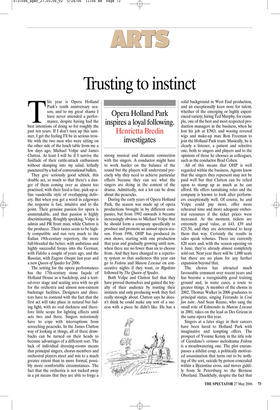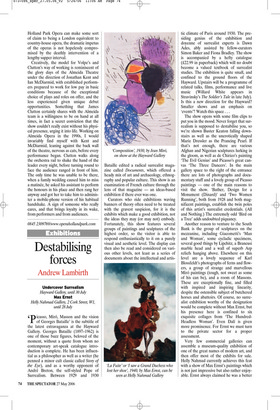Trusting to instinct
Opera Holland Park inspires a loyal following. Henrietta Bredin investigates
This year is Opera Holland Park’s tenth anniversary season, and to my great shame I have never attended a performance, despite having had the best intentions of doing so for roughly the past ten years. If I don’t turn up this summer, I get the feeling I’ll be in serious trouble with the two men who were sitting on the other side of the lunch table from me a few days ago, Michael Volpe and James Clutton. At least I will be if I survive the fusillade of their rattle-attack enthusiasm without slumping into my salad, lethally punctured by a hail of conversational bullets.
They give seriously good schtick, this double act, so much so that there’s a danger of them coming over as almost too practised, with their feed-a-line, pick-up-aline vaudeville style of overlapping delivery. But when you get a word in edgeways the response is fast, intuitive and to the point. Their genuine passion for opera is unmistakable, and that passion is highly discriminating. Roughly speaking, Volpe is admin and PR front man, while Clutton is the producer. Their tastes seem to be highly compatible and run very much to the Italian 19th-century repertory, the more full-blooded the better, with ambitious and highly successful forays into the German, with Fidelio a couple of years ago, and the Russian, with Eugene Onegin last year and a new Queen of Spades for 2006.
The setting for the opera performances has the 17th-century stone façade of Holland House as a backdrop, and a tented-over stage and seating area with no pit for the orchestra and almost non-existent backstage facilities. Designers and directors have to contend with the fact that the first act will take place in natural but fading light, with no real darkness and therefore little scope for lighting effects until acts two and three. Singers notoriously have to cope with interruptions from screeching peacocks. In the James Clutton way of looking at things, all of these drawbacks can be turned on their heads to become advantages of a different sort. The lack of individual dressing-rooms means that principal singers, chorus members and orchestral players meet and mix to a much greater extent than in more formal, possibly more comfortable circumstances. The fact that the orchestra is not tucked away in a pit means that they are able to forge a strong musical and dramatic connection with the singers. A conductor might have to work harder on the balance of the sound but the players will understand precisely why they need to achieve particular effects because they can see what the singers are doing in the context of the drama. Admittedly, not a lot can be done about the peacocks.
During the early years of Opera Holland Park, the season was made up of opera productions brought in by different companies, but from 1992 onwards it became increasingly obvious to Michael Volpe that he should form a company specifically to produce and promote an annual opera season. From 1996, OHP has produced its own shows, starting with one production that year and gradually growing until now, when there are no fewer than six to choose from. And they have changed to a repertory system so that audiences this year can go to Fedora and Manon Lescaut on consecutive nights if they want, or Rigoletto followed by The Queen of Spades.
Both Volpe and Clutton feel that they have proved themselves and gained the loyalty of their audience by trusting their instincts and only producing work they feel really strongly about. Clutton says he doesn’t think he could make any sort of a success with a piece he didn’t like. He has a solid background in West End production, and an exceptionally keen nose for talent, whether of the emerging or highly experienced variety; hiring Ted Murphy, for example, one of the best and most respected production managers in the business, when he lost his job at ENO, and wooing revered wigs and make-up man Ron Freeman to join the Holland Park team. Musically, he is clearly a listener, a patient and selective one, both to singers and players and to the opinions of those he chooses as colleagues, such as the conductor Brad Cohen.
All of this means that OHP is well regarded within the business. Agents know that the singers they represent may not be paid well but that Clutton can be relied upon to stump up as much as he can afford. He offers tantalising roles and the company is known to look after performers exceptionally well. Of course, he and Volpe could pay more, offer more rehearsal time and more adequate orchestral resources if the ticket prices were increased. At the moment, tickets are extremely good value, at £43, £39 and £21.50, and they are determined to keep them that way. Certainly the results in sales speak volumes. There are currently 820 seats and, with the season opening on 6 June, they’re already almost completely sold out. Next year there will be 1,000 seats but there are no plans for any further expansion beyond that.
The chorus has attracted much favourable comment over recent years and has become a recognisably good training ground and, in some cases, a route to greater things. A member of the chorus in 2002, Thomas Walker in 2006 graduates to principal status, singing Ferrando in Così fan tutte. And Sean Ruane, who sang the small role of Edmondo in Manon Lescaut in 2001, takes on the lead as Des Grieux in the same opera this year.
Singers at a later stage in their careers have been lured to Holland Park with imaginative and tempting offers. The prospect of Yvonne Kenny in the title role of Giordano’s verismo melodrama Fedora is a mouthwatering one. The plot encompasses a nihilist coup, a politically motivated assassination that turns out to be nothing of the sort, suicide by poison concealed within a Byzantine cross, and moves giddily from St Petersburg to the Bernese Oberland. Thankfully, despite the fact that Holland Park Opera can make some sort of claim to being a London equivalent to country-house opera, the dramatic impetus of the operas is not hopelessly compromised by the deathly intervention of a lengthy supper interval.
Creatively, the model for Volpe’s and Clutton’s way of working is reminiscent of the glory days of the Almeida Theatre under the direction of Jonathan Kent and Ian McDiarmid, with established performers prepared to work for low pay in basic conditions because of the exceptional choice of plays and roles on offer, and the less experienced given unique debut opportunities. Something that James Clutton certainly shares with the Almeida team is a willingness to be on hand at all times, in fact a secret conviction that the show couldn’t really exist without his physical presence, urging it into life. Working on Almeida Opera in the 1990s, I would invariably find myself with Kent and McDiarmid, leaning against the back wall of the theatre, nervous as cats, before every performance began. Clutton walks along the orchestra rail to shake the hand of the leader every night, before turning round to face the audience ranged in front of him. The only time he was unable to be there, when a family wedding caused him to miss a matinée, he asked his assistant to perform the honours in his place and then rang her anyway and got her to take him to administer a mobile-phone version of his habitual handshake. A sign of someone who really cares, and that brings loyalty in its wake, from performers and from audiences.
0845 2309769/www.operahollandpark.com











































































































 Previous page
Previous page